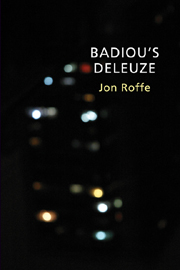8 - A singular palimpsest
Summary
This book has been prosecuted in the vein of an adversarial trial. At issue has been neither the correctness of Deleuze's philosophy, nor indeed that of Badiou, but rather the evidence in Deleuze's philosophy to support the reading offered of his work by Badiou in The Clamor of Being and the texts related to it. Or, better, since it has no recourse to the moral and imperial tone of the ideal of judgement, what has been pursued is a partial set of enquiries or queries. These queries have concerned a list of issues and concepts, a set of cases: being, method, the virtual, time, truth, the event, subjectivity and thought. I have attempted, relative to each case, an assessment of Badiou's assertions about Deleuze in the light of specific moments in Deleuze's work, and against the background of Badiou's own account of the issues that he takes up again in Deleuze.
It may be objected that such an approach to august philosophical texts is far from philosophical. Perhaps. We should, though, recall that decisive law, one that is always put into play when we turn to the explication of another's thought, expressed by Nietzsche in Ecce Homo, in an exclamation that takes on a tragic colour in the light of history: “Above all, do not mistake me for someone else!” (Nietzsche 1992: 673). Of course, the reasons by which one writer might mistake another in this fashion are not necessarily simple. The fact that such an ensemble of misinterpretations is indeed prosecuted by Badiou has nonetheless been demonstrated in each of these cases.
- Type
- Chapter
- Information
- Badiou's Deleuze , pp. 160 - 162Publisher: Acumen PublishingPrint publication year: 2011

